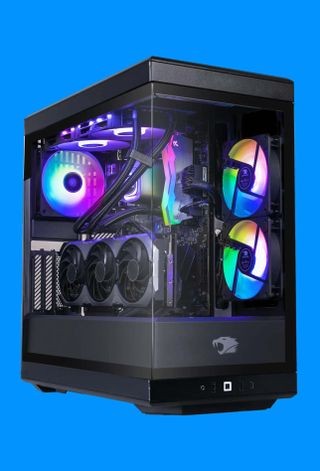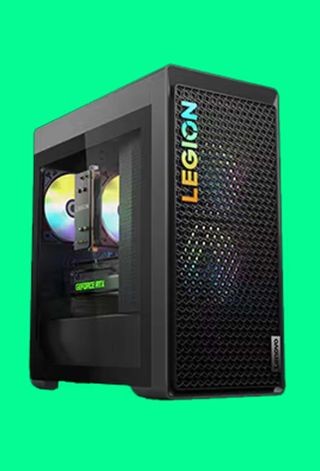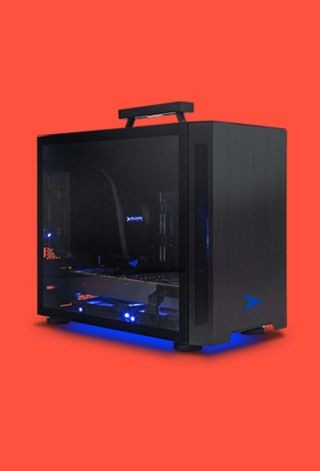Navigating the world of gaming PCs can be daunting, but understanding how much a gaming PC costs is the first step towards building or buying the perfect rig. At HOW.EDU.VN, we provide expert guidance to help you make informed decisions, ensuring you get the best value for your investment in gaming hardware. Whether you’re looking for a budget-friendly option or a high-end powerhouse, understanding pricing, components, and performance is key to a satisfying gaming experience.
1. Understanding the Core Components and Their Costs
When determining the price of a gaming PC, it’s crucial to understand the major components and how they contribute to the overall cost. The central processing unit (CPU), graphics processing unit (GPU), memory (RAM), storage (SSD or HDD), motherboard, power supply unit (PSU), case, and cooling system all play vital roles.
- CPU (Central Processing Unit): The brain of your PC, responsible for processing instructions and running applications.
- GPU (Graphics Processing Unit): Handles the visual output, crucial for gaming performance.
- RAM (Random Access Memory): Short-term memory for running applications.
- Storage (SSD/HDD): Where your operating system, games, and files are stored.
- Motherboard: Connects all the components and allows them to communicate.
- PSU (Power Supply Unit): Provides power to all components.
- Case: Houses and protects all the internal components.
- Cooling System: Keeps the components from overheating.
| Component | Description | Price Range (USD) |
|---|---|---|
| CPU | AMD Ryzen or Intel Core processors | $100 – $800 |
| GPU | NVIDIA GeForce RTX or AMD Radeon RX series | $150 – $2000+ |
| RAM | DDR4 or DDR5, typically 16GB or 32GB | $50 – $200 |
| SSD/HDD | NVMe SSDs are faster but more expensive; HDDs offer more storage | $50 – $500 |
| Motherboard | ATX, Micro-ATX, or Mini-ITX | $80 – $500 |
| PSU | 550W to 850W, depending on the system’s power requirements | $50 – $300 |
| Case | Mid-tower or full-tower, with good airflow and aesthetics | $50 – $300 |
| Cooling System | Air coolers or liquid coolers for optimal temperature management | $30 – $300 |




2. Defining Your Gaming Needs and Budget
Before diving into specific builds, defining your gaming needs and budget is essential for determining the gaming PC price. Consider the following factors:
- Target Resolution and Refresh Rate: Are you aiming for 1080p 60Hz, 1440p 144Hz, or 4K 60Hz gaming?
- Game Genres: Different games have different hardware requirements.
- Longevity: How long do you want the PC to remain relevant before upgrading?
- Budget: Set a realistic budget that aligns with your gaming goals.
2.1. Understanding Intended Use
- Casual Gaming (1080p, 60Hz): For playing less demanding games at lower settings.
- Mid-Range Gaming (1440p, 144Hz): Balances performance and visual quality.
- High-End Gaming (4K, 60Hz or higher): For the best possible gaming experience with high frame rates and graphical settings.
2.2. Setting a Realistic Budget
- Budget Gaming PC (Under $800): Suitable for entry-level gaming with some compromises on graphics settings.
- Mid-Range Gaming PC ($800 – $1500): Offers a good balance of performance and future-proofing.
- High-End Gaming PC ($1500+): Provides the best possible gaming experience with high-end components.
3. Pre-Built vs. Custom-Built Gaming PCs
When considering gaming PC costs, you have two main options: buying a pre-built system or building one yourself. Each option has its pros and cons.
3.1. Pre-Built Gaming PCs
Pros:
- Convenience: Ready to use out of the box.
- Warranty: Typically covers the entire system.
- Professional Assembly: Ensures proper component installation.
- Aesthetics: Often features unique case designs and RGB lighting.
Cons:
- Less Customization: Limited component choices.
- Higher Cost: Premium for convenience and assembly.
- Potential for Lower Quality Components: Manufacturers may cut corners on certain parts.
3.2. Custom-Built Gaming PCs
Pros:
- Full Customization: Choose every component based on your needs and budget.
- Potential Cost Savings: Can be cheaper than pre-built systems for equivalent performance.
- Upgradeability: Easier to upgrade individual components.
- Learning Experience: Gain knowledge about PC hardware and assembly.
Cons:
- Time-Consuming: Requires research and assembly time.
- No System-Wide Warranty: Warranties only cover individual components.
- Risk of Compatibility Issues: Ensuring all components work together can be challenging.
- Assembly Errors: Potential for mistakes during the build process.
4. Budget Breakdown for Different Gaming PC Tiers
Understanding the cost breakdown of a gaming PC can help you allocate your budget effectively. Here are sample budget breakdowns for budget, mid-range, and high-end gaming PCs:
4.1. Budget Gaming PC (Under $800)
- CPU: AMD Ryzen 5 5600G ($150)
- GPU: AMD Radeon RX 6600 ($200)
- RAM: 16GB DDR4 3200MHz ($50)
- SSD: 500GB NVMe SSD ($50)
- Motherboard: AMD B450 ($80)
- PSU: 550W 80+ Bronze ($50)
- Case: Mid-Tower ATX ($50)
- Cooler: Stock Cooler ($0)
4.2. Mid-Range Gaming PC ($800 – $1500)
- CPU: Intel Core i5-13600K or AMD Ryzen 5 7600X ($300)
- GPU: NVIDIA GeForce RTX 3060 Ti or AMD Radeon RX 6700 XT ($400)
- RAM: 16GB DDR5 5200MHz ($80)
- SSD: 1TB NVMe SSD ($80)
- Motherboard: Intel B660 or AMD B650 ($150)
- PSU: 650W 80+ Gold ($80)
- Case: Mid-Tower ATX with good airflow ($80)
- Cooler: Aftermarket Air Cooler ($50)
4.3. High-End Gaming PC ($1500+)
- CPU: Intel Core i7-14700K or AMD Ryzen 7 7700X ($400)
- GPU: NVIDIA GeForce RTX 4070 or AMD Radeon RX 7800 XT ($600)
- RAM: 32GB DDR5 6000MHz ($150)
- SSD: 2TB NVMe SSD ($150)
- Motherboard: Intel Z790 or AMD X670 ($300)
- PSU: 850W 80+ Gold ($150)
- Case: Full-Tower ATX with excellent airflow ($150)
- Cooler: High-End Liquid Cooler ($200)
5. Key Components Explained
Delving deeper into each component helps understand how much does a gaming computer cost.
5.1. CPU (Central Processing Unit)
- Intel vs. AMD: Both offer competitive CPUs, with Intel generally leading in single-core performance and AMD offering better value for multi-core tasks.
- Cores and Threads: More cores and threads can improve performance in multi-threaded applications and games.
- Clock Speed: Higher clock speeds generally translate to better performance.
- Considerations: For gaming, a mid-range CPU like the Intel Core i5 or AMD Ryzen 5 series is often sufficient.
5.2. GPU (Graphics Processing Unit)
- NVIDIA vs. AMD: NVIDIA is known for its RTX series with ray tracing and DLSS, while AMD offers competitive performance with its Radeon RX series.
- VRAM: More video RAM (VRAM) is better for higher resolutions and texture settings.
- Performance Tiers:
- Entry-Level: NVIDIA GeForce RTX 3050/3060 or AMD Radeon RX 6600/6650 XT
- Mid-Range: NVIDIA GeForce RTX 3060 Ti/3070 or AMD Radeon RX 6700 XT/6800
- High-End: NVIDIA GeForce RTX 3080/3090 or AMD Radeon RX 6800 XT/6900 XT
- Considerations: The GPU is the most important component for gaming, so allocate a significant portion of your budget to it.
5.3. RAM (Random Access Memory)
- Capacity: 16GB is the sweet spot for most modern games, but 32GB is recommended for high-end gaming and multitasking.
- Speed: Higher RAM speeds can improve performance, especially with AMD Ryzen CPUs.
- DDR4 vs. DDR5: DDR5 offers higher speeds and bandwidth but is more expensive and requires a compatible motherboard.
- Considerations: Ensure your motherboard supports the type and speed of RAM you choose.
5.4. Storage (SSD/HDD)
- SSD vs. HDD: SSDs offer much faster read and write speeds, resulting in quicker boot times and game loading. HDDs provide more storage at a lower cost but are significantly slower.
- NVMe vs. SATA SSDs: NVMe SSDs are faster than SATA SSDs and connect directly to the motherboard via the M.2 slot.
- Capacity: A 1TB SSD is recommended for storing your operating system, games, and frequently used applications.
- Considerations: Consider a combination of an SSD for fast performance and an HDD for mass storage.
5.5. Motherboard
- Form Factor: ATX, Micro-ATX, and Mini-ITX are the most common form factors. ATX offers the most expansion slots, while Mini-ITX is the smallest.
- Chipset: The chipset determines the CPU compatibility and features of the motherboard.
- Features: Look for features like USB ports, M.2 slots, PCIe slots, and VRM quality.
- Considerations: Choose a motherboard that supports your CPU, RAM, and other components.
5.6. PSU (Power Supply Unit)
- Wattage: Choose a PSU with enough wattage to power all your components, with some headroom for future upgrades.
- 80+ Certification: Indicates the efficiency of the PSU. Look for 80+ Bronze, Silver, Gold, or Platinum.
- Modular vs. Non-Modular: Modular PSUs allow you to remove unnecessary cables, improving airflow and cable management.
- Considerations: A high-quality PSU is essential for the stability and longevity of your system.
5.7. Case
- Form Factor: Choose a case that supports your motherboard form factor and has enough space for all your components.
- Airflow: Good airflow is essential for keeping your components cool. Look for cases with mesh panels and multiple fan mounts.
- Aesthetics: Choose a case that matches your personal style.
- Considerations: Consider cable management features and ease of access when choosing a case.
5.8. Cooling System
- Air Coolers: Affordable and reliable, air coolers are a good option for budget and mid-range builds.
- Liquid Coolers: More expensive but offer better cooling performance, especially for high-end CPUs.
- Considerations: Choose a cooler that is compatible with your CPU and case.
6. Peripherals and Accessories
When calculating the overall gaming PC price point, don’t forget about peripherals and accessories:
- Monitor: A high-refresh-rate monitor can significantly improve the gaming experience.
- Keyboard and Mouse: Choose a keyboard and mouse that are comfortable and responsive.
- Headset: A good headset can enhance immersion and communication with other players.
- Operating System: Windows 10 or 11.
- Considerations: Peripherals can add a significant cost to your gaming setup, so factor them into your budget.
| Peripheral | Description | Price Range (USD) |
|---|---|---|
| Monitor | 1080p, 1440p, or 4K resolution; high refresh rate | $100 – $1000+ |
| Keyboard | Mechanical or membrane; wired or wireless | $30 – $300 |
| Mouse | Optical or laser; wired or wireless | $20 – $200 |
| Headset | Wired or wireless; with microphone | $30 – $300 |
| Operating System | Windows 10 or 11 | $100 – $200 |
7. Tips for Saving Money
Here are some tips to help you save money while building or buying a gaming PC:
- Shop Around: Compare prices from different retailers.
- Wait for Sales: Take advantage of seasonal sales and promotions.
- Buy Used Components: Consider buying used components from reputable sources.
- DIY Assembly: Build the PC yourself to save on assembly costs.
- Refurbished Options: Check if they are available from retailers.
- Prioritize Components: Focus on the most important components for gaming performance.
- Upgrade Gradually: Start with a basic system and upgrade components over time.
8. Future-Proofing Your Gaming PC
To maximize the lifespan of your gaming PC, consider the following future-proofing tips:
- Choose a Motherboard with Upgrade Paths: Select a motherboard that supports future CPU generations.
- Invest in a High-Wattage PSU: Ensure your PSU has enough wattage for future upgrades.
- Select a Case with Good Airflow: Good airflow will help keep your components cool, even as they become more powerful.
- Consider Liquid Cooling: Liquid coolers offer better cooling performance and can help extend the lifespan of your CPU.
- Choose a GPU with Ample VRAM: More VRAM will allow you to run games at higher resolutions and texture settings.
- Buy Extra Storage: Games are getting larger, so invest in ample storage capacity.
- Plan for Component Compatibility: Ensure all components are compatible and will work together seamlessly.
9. Expert Recommendations and Builds
At HOW.EDU.VN, our team of experts can provide personalized recommendations and build guides tailored to your specific gaming needs and budget. We can help you choose the best components, optimize your system for performance, and troubleshoot any issues you may encounter.
9.1. Example Builds
Here are a few example builds to get you started:
- Entry-Level Gaming PC: AMD Ryzen 5 5600G, AMD Radeon RX 6600, 16GB DDR4, 500GB NVMe SSD – $700
- Mid-Range Gaming PC: Intel Core i5-13600K, NVIDIA GeForce RTX 3060 Ti, 16GB DDR5, 1TB NVMe SSD – $1200
- High-End Gaming PC: Intel Core i7-14700K, NVIDIA GeForce RTX 4070, 32GB DDR5, 2TB NVMe SSD – $2000
9.2. How HOW.EDU.VN Can Help
- Personalized Consultation: Our experts can provide personalized recommendations based on your specific needs and budget.
- Custom Build Guides: We can create custom build guides with step-by-step instructions and component recommendations.
- Troubleshooting Support: We can help you troubleshoot any issues you may encounter during the build process or after.
- Component Selection Assistance: Our experts can help you choose the best components for your gaming needs.
- Performance Optimization: We can provide tips and tricks for optimizing your system for performance.
- Expert Advice: Benefit from the knowledge and experience of our team of PC gaming experts.
10. Staying Updated with the Latest Trends
The PC gaming market is constantly evolving, with new components and technologies being released regularly. Staying updated with the latest trends can help you make informed decisions and get the best value for your money.
10.1. Key Trends to Watch
- New CPU and GPU Releases: Keep an eye on new CPU and GPU releases from Intel, AMD, and NVIDIA.
- DDR5 RAM Adoption: DDR5 RAM is becoming more mainstream, so consider it for your next build.
- NVMe SSDs: NVMe SSDs are becoming more affordable, making them a great option for fast storage.
- Ray Tracing and DLSS: Ray tracing and DLSS are becoming more popular, so consider a GPU that supports these technologies.
- Mini PCs: The rise of Mini PCs offering great performance in a compact form factor.
10.2. Resources for Staying Informed
- Tech Websites and Forums: Follow reputable tech websites and forums for the latest news and reviews.
- YouTube Channels: Subscribe to PC gaming YouTube channels for build guides, reviews, and performance tests.
- Social Media: Follow PC gaming influencers and brands on social media for the latest updates.
11. Common Mistakes to Avoid
Building or buying a gaming PC can be a complex process, and it’s easy to make mistakes. Here are some common mistakes to avoid:
- Not Doing Enough Research: Research components, compatibility, and performance before making any purchases.
- Underestimating Power Requirements: Choose a PSU with enough wattage to power all your components, with some headroom for future upgrades.
- Neglecting Cooling: Ensure your system has adequate cooling to prevent overheating.
- Ignoring Compatibility: Ensure all components are compatible with each other.
- Cutting Corners on Quality: Invest in high-quality components from reputable brands.
- Forgetting Peripherals: Factor in the cost of peripherals, such as a monitor, keyboard, and mouse.
- Skipping the Operating System: A genuine OS is a must to get the most out of your gaming PC.
12. Case Studies: Real-World Examples
Examining real-world examples can provide valuable insights into the gaming PC price and performance.
12.1. Case Study 1: Budget Gaming PC for eSports
- Goal: Build a budget gaming PC for playing eSports titles like Counter-Strike: Global Offensive and League of Legends at 1080p 144Hz.
- Components: AMD Ryzen 5 5600G, AMD Radeon RX 6600, 16GB DDR4 3200MHz, 500GB NVMe SSD.
- Total Cost: $700
- Performance: Achieves 144+ FPS in eSports titles at 1080p with high settings.
12.2. Case Study 2: Mid-Range Gaming PC for AAA Titles
- Goal: Build a mid-range gaming PC for playing AAA titles like Cyberpunk 2077 and Assassin’s Creed Valhalla at 1440p 60Hz.
- Components: Intel Core i5-13600K, NVIDIA GeForce RTX 3060 Ti, 16GB DDR5 5200MHz, 1TB NVMe SSD.
- Total Cost: $1200
- Performance: Achieves 60+ FPS in AAA titles at 1440p with medium to high settings.
12.3. Case Study 3: High-End Gaming PC for 4K Gaming
- Goal: Build a high-end gaming PC for playing AAA titles at 4K 60Hz or higher with maximum settings.
- Components: Intel Core i7-14700K, NVIDIA GeForce RTX 4070, 32GB DDR5 6000MHz, 2TB NVMe SSD.
- Total Cost: $2000
- Performance: Achieves 60+ FPS in AAA titles at 4K with maximum settings.
13. Navigating the Current Market Conditions
The pricing and availability of PC components can fluctuate due to various factors, such as supply chain disruptions, tariffs, and demand.
13.1. Factors Affecting Component Prices
- Supply Chain Disruptions: Global events can disrupt the supply chain, leading to shortages and price increases.
- Tariffs: Tariffs on imported components can increase prices.
- Demand: High demand for certain components can lead to price increases.
- Cryptocurrency Mining: High demand for GPUs from cryptocurrency miners can drive up prices.
13.2. Strategies for Dealing with Fluctuating Prices
- Be Patient: Wait for prices to drop before making a purchase.
- Consider Alternatives: Consider alternative components that offer similar performance at a lower price.
- Buy in Bulk: Buying multiple components at once can sometimes save money.
- Monitor Prices Regularly: Track prices from different retailers to find the best deals.
14. The Importance of Professional Consultation
Building or buying a gaming PC can be a complex and challenging process. Seeking professional consultation from experts like those at HOW.EDU.VN can help you make informed decisions, avoid common mistakes, and get the best value for your money.
14.1. Benefits of Consulting with Experts
- Personalized Recommendations: Get personalized recommendations based on your specific needs and budget.
- Expert Advice: Benefit from the knowledge and experience of PC gaming experts.
- Component Compatibility: Ensure all components are compatible with each other.
- Troubleshooting Support: Get help troubleshooting any issues you may encounter.
- Performance Optimization: Learn how to optimize your system for performance.
14.2. How to Get in Touch with HOW.EDU.VN
To get personalized consultation and expert advice, contact us at:
- Address: 456 Expertise Plaza, Consult City, CA 90210, United States
- WhatsApp: +1 (310) 555-1212
- Website: HOW.EDU.VN
Our team of experienced doctors and experts is ready to assist you with all your PC gaming needs.
15. Frequently Asked Questions (FAQ)
Here are some frequently asked questions about how much a PC for gaming costs:
-
How much should I spend on a gaming PC?
The amount you should spend depends on your gaming needs and budget. A budget gaming PC can cost under $800, while a high-end gaming PC can cost $1500 or more.
-
Is it cheaper to build or buy a gaming PC?
Building a gaming PC can be cheaper than buying a pre-built system for equivalent performance. However, it requires more time and effort.
-
What is the most important component for gaming?
The GPU (graphics processing unit) is the most important component for gaming.
-
How much RAM do I need for gaming?
16GB of RAM is the sweet spot for most modern games, but 32GB is recommended for high-end gaming and multitasking.
-
Should I buy an SSD or HDD for gaming?
SSDs offer much faster read and write speeds, resulting in quicker boot times and game loading. A 1TB SSD is recommended for storing your operating system, games, and frequently used applications.
-
What is the best CPU for gaming?
The best CPU for gaming depends on your budget and needs. Mid-range CPUs like the Intel Core i5 or AMD Ryzen 5 series are often sufficient.
-
How can I save money on a gaming PC?
Shop around, wait for sales, buy used components, build the PC yourself, and prioritize components.
-
How can I future-proof my gaming PC?
Choose a motherboard with upgrade paths, invest in a high-wattage PSU, select a case with good airflow, and choose a GPU with ample VRAM.
-
What are the common mistakes to avoid when building a gaming PC?
Not doing enough research, underestimating power requirements, neglecting cooling, ignoring compatibility, and cutting corners on quality are common mistakes to avoid.
-
Where can I get expert advice on building or buying a gaming PC?
Contact HOW.EDU.VN for personalized consultation and expert advice from our team of experienced professionals.
Investing in a gaming PC is a significant decision that requires careful planning and research. By understanding the core components, defining your gaming needs and budget, and following our expert tips and recommendations, you can build or buy the perfect gaming PC for your needs. Don’t hesitate to reach out to HOW.EDU.VN for personalized consultation and expert advice to ensure you get the best value for your money and a fantastic gaming experience. We want to connect you with our team of over 100 famous Doctors from around the world for a personal consultation today. Visit how.edu.vn or call +1 (310) 555-1212 today.

